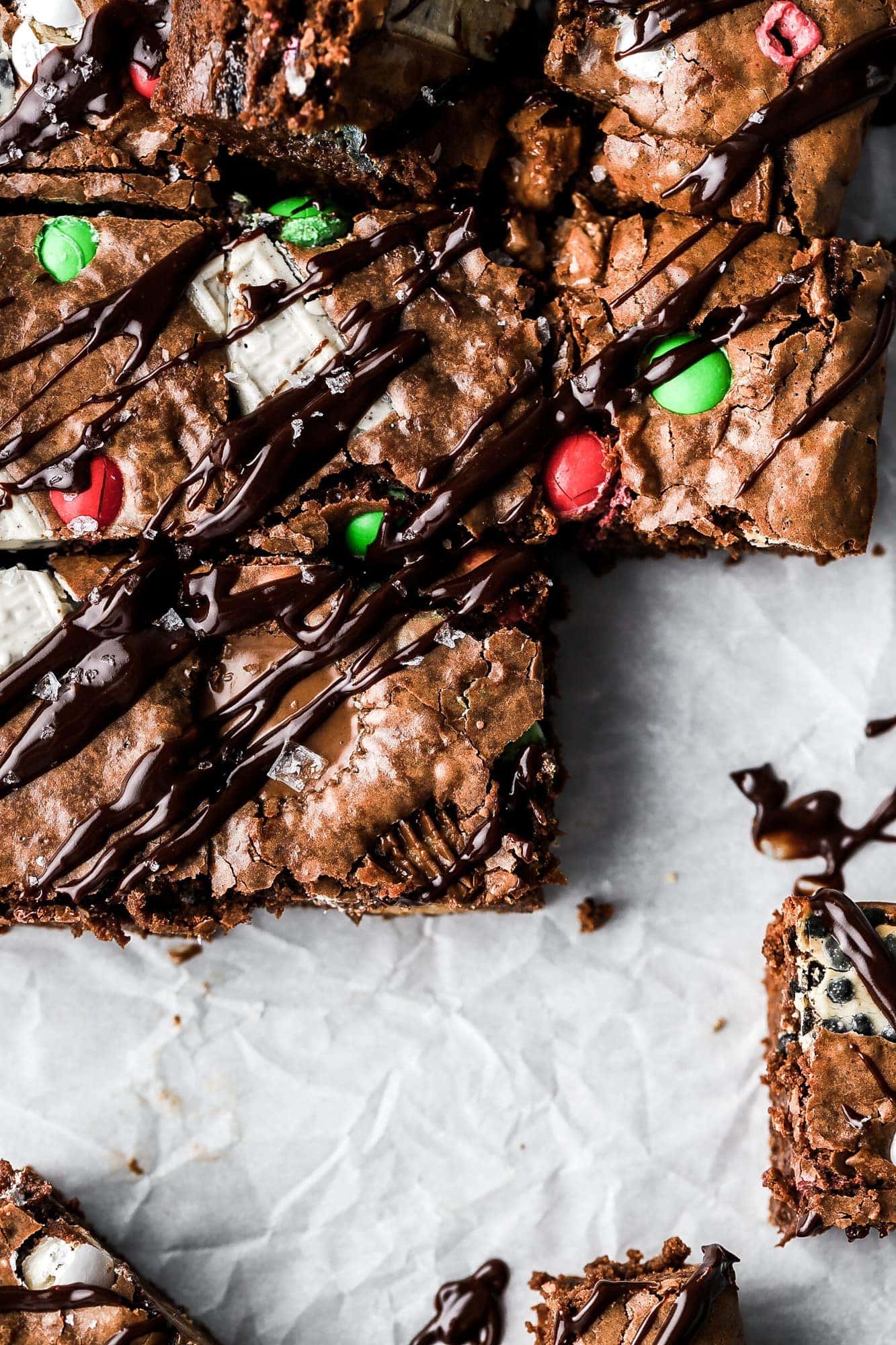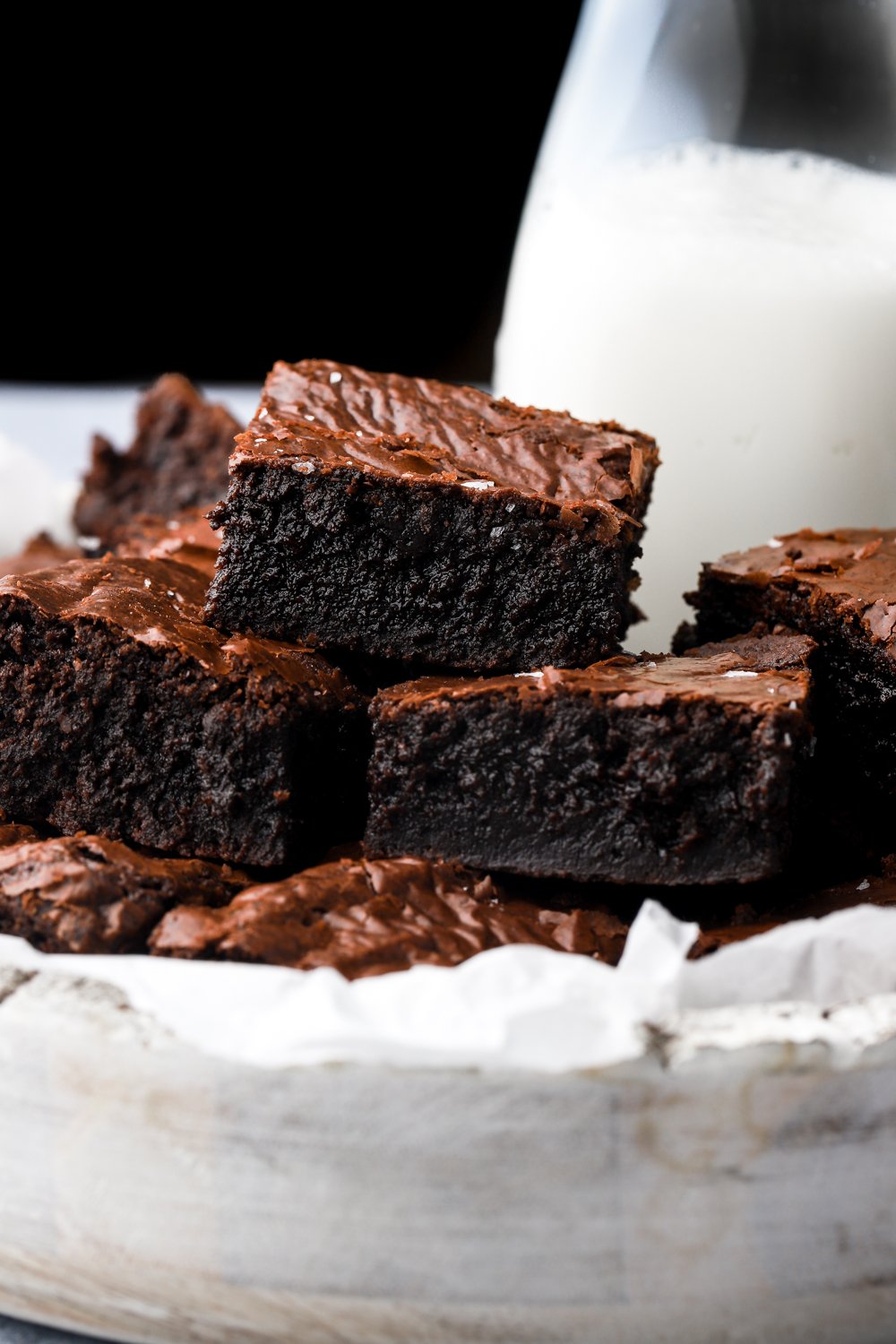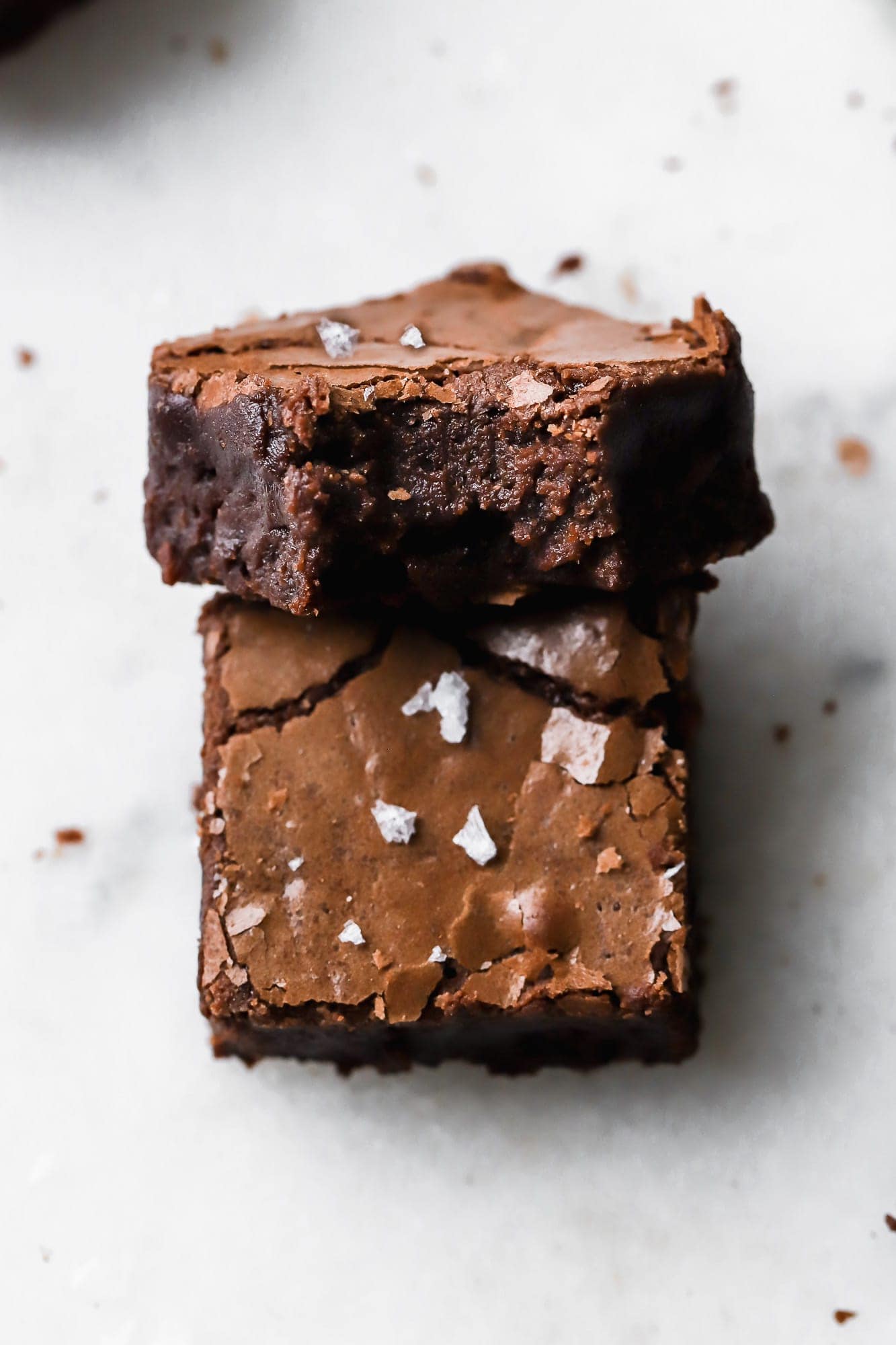Brownie Pie
The fudgiest brownie baked inside of a flakey, buttery pie crust and topped with a whole tub of vanilla ice cream and salted caramel sauce!
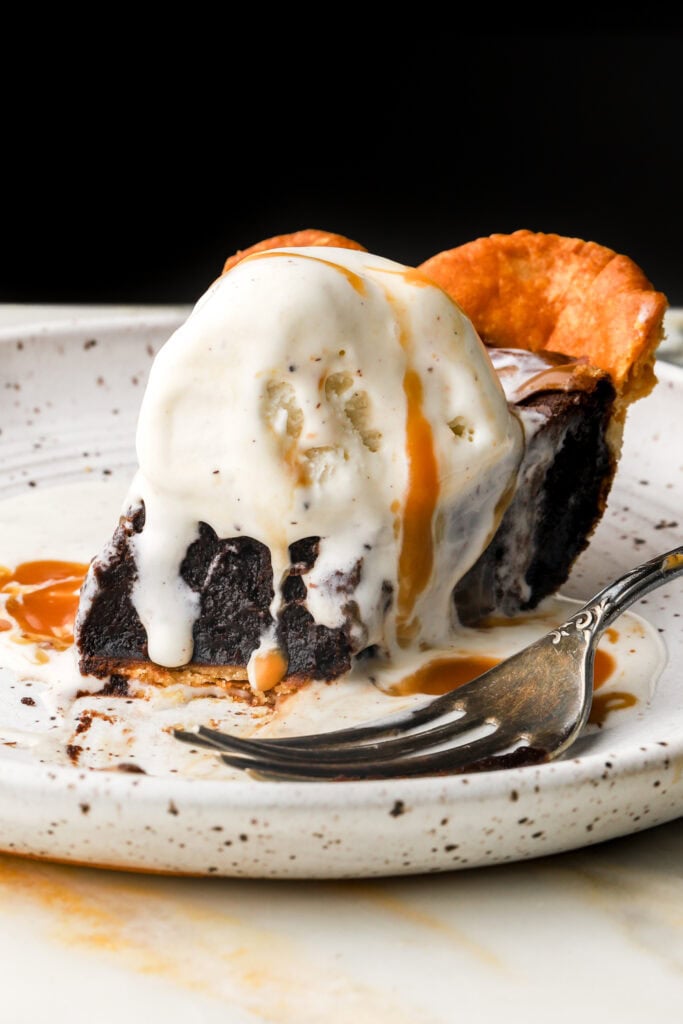
Why You’ll Love This Brownie Pie
- We just take two relatively simple recipes and combine them into one treat! Pie crust and brownies, yes please!
- The brownie filling pairs so well with a flakey crust taking your brownie game to the next level.
- I never thought of chocolate as a “fall” flavor but this pie is great for all my non-fruit pie loving friends.
- It’s the PERFECT make ahead dessert for thanksgiving because it needs a good chill time anyway!
If you’re looking for something more classic, try my dutch apple pie, caramel pecan pie, or pumpkin meringue pie. Some other fun twists on classics are my puff pastry apple pie, apple cream pie.
This recipe just uses my Brown Butter Brownies baked inside my All-Butter Pie Crust. You also can try my Chocolate Pecan Pie if you want something similar to this, but slightly more traditional feeling.
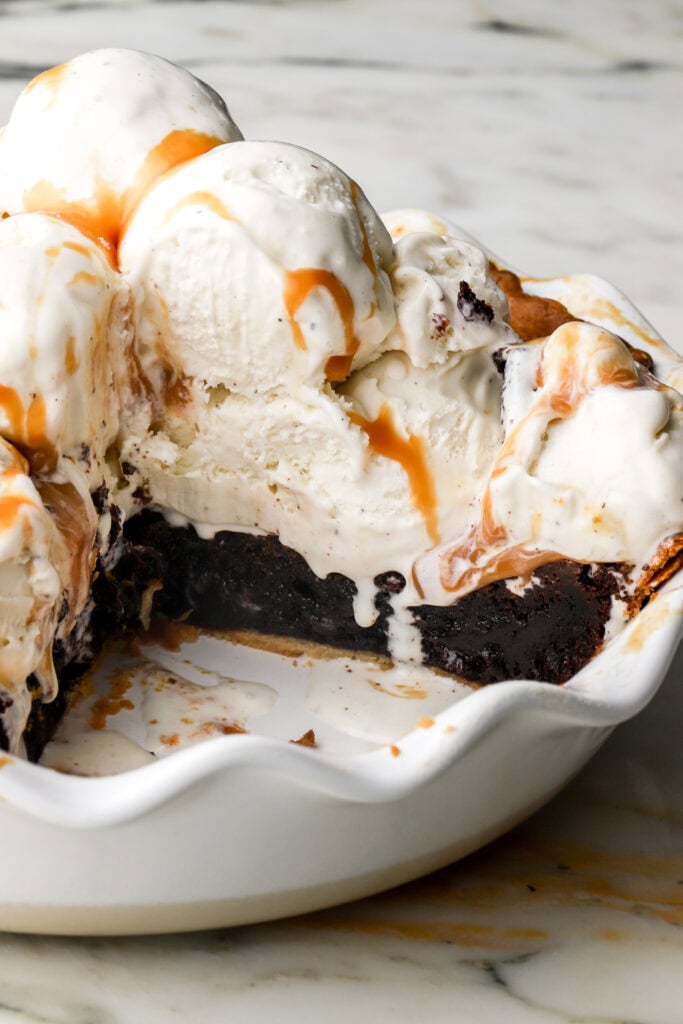
Ingredients
- Flour: I just use all purpose flour for the crust and the brownie filling. There is such a thing as pastry flour and I know some people like cake flour for pie crusts too but all-purpose works perfectly fine here.
- I also HIGHLY recommend using a digital scale, as flour is almost always over measured.
- Butter: I love using salted butter in almost everything, except buttercream, but unsalted works fine too, I would just add an extra pinch of salt.
- Water: you’ll want ice cold water. I measure my water first, place it in the freezer while I get the rest of my ingredients ready and then bring it out when I need it (make sure it doesn’t actually freeze though lol).
- Alcohol: Never have I ever had a flakier crust than when I added 1-2 Tbsp of alcohol. Because alcohol inhibits the development of gluten, it allows you to add a little more liquid without risking a tougher pastry. My best results were with whiskey, but any type of spirit will work fine and won’t impart any flavor unless you use more.
- This is totally optional and not necessary but definitely recommended to replace 2 Tbsp of the water with alcohol.
- Sugar: I use light brown and granulated sugar for the filling.
- Eggs: I use large room temperature eggs for the filling. I recommend placing them in hot water for a few minutes if they’re cold.
- Cocoa Powder: I love using dutch-processed cocoa powder but any unsweetened cocoa will work.
- Chocolate Chips: I recommend using chocolate chips as they’ll help the pie set better due to the stabilizers found in chocolate chips. I love dark chocolate but it does make this pie very rich and not super sweet so if you’re a milk chocolate fanatic, have at it!
- Vanilla: vanilla extract or vanilla bean paste will work fine.
- Salt: I like fine sea salt and salt flakes for the topping.
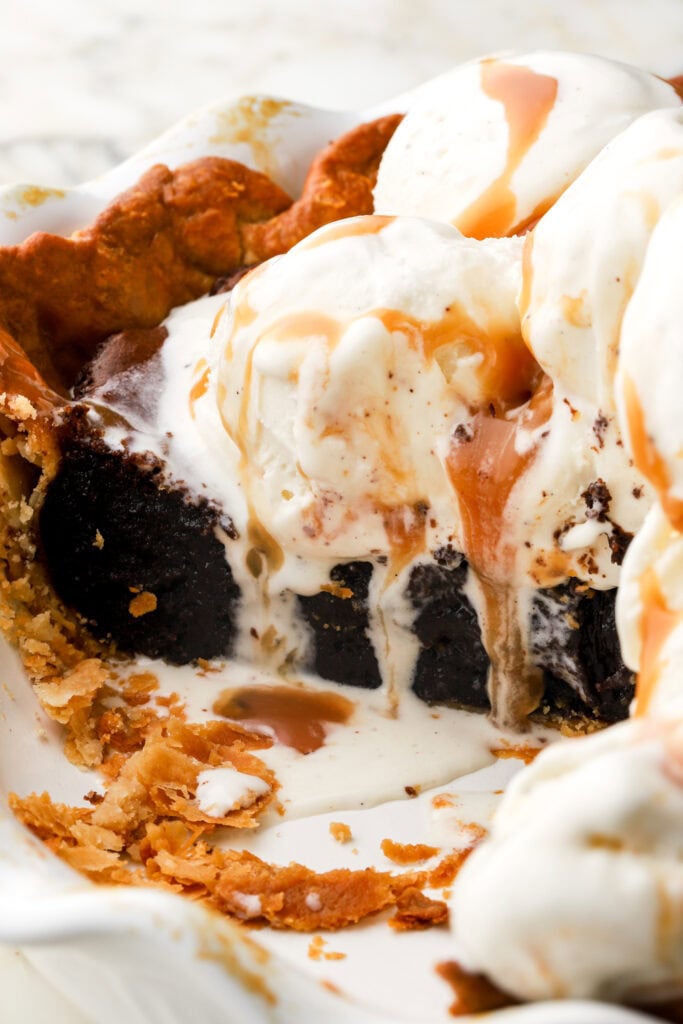
Step-by-Step Instructions
The Pie Crust
Step 1: Cube cold butter and then place it back in the fridge, measure out flour and place it in the fridge or freezer, measure out water with alcohol and place it in the freezer for 15 minutes.
Step 2: Place flour in a food processor and place the cubed butter on top. Pulse for a few seconds until the butter and flour look like small crumbles.
Step 3: Drizzle in half the water and alcohol and pulse, then drizzle in a little more at a time just until the dough starts to look more wet. The dough will still be crumbly but when you press on it, it should stick together.
Step 4: Dump the mixture onto the countertop and use your hands to press it all together and fold it over itself a couple of times so it all sticks together nicely. You should see bits of butter in the dough and it should be fully hydrated (so no dry flour spots) but not too sticky to handle.
Step 5: Wrap the disc in plastic wrap and place in the fridge for 1-2 hours. Then roll it out and place it into a pie dish. Fill the pie with pie weights and bake for 20 minutes. Remove the pie weights and bake for about 10 more minutes, until it’s golden brown. Allow to cool completely before filling.
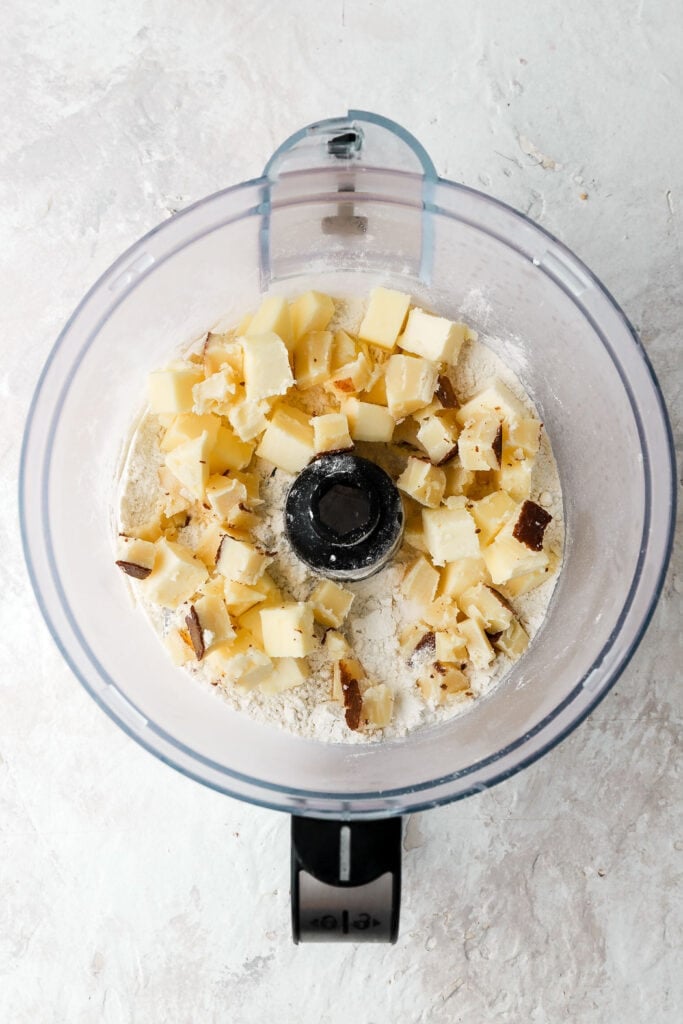
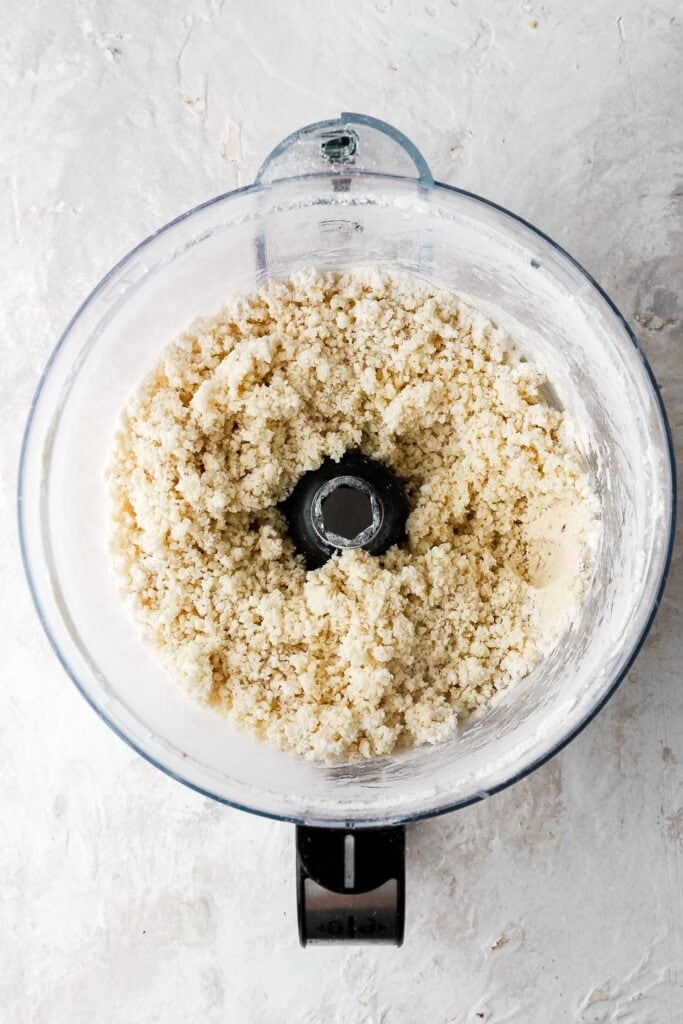
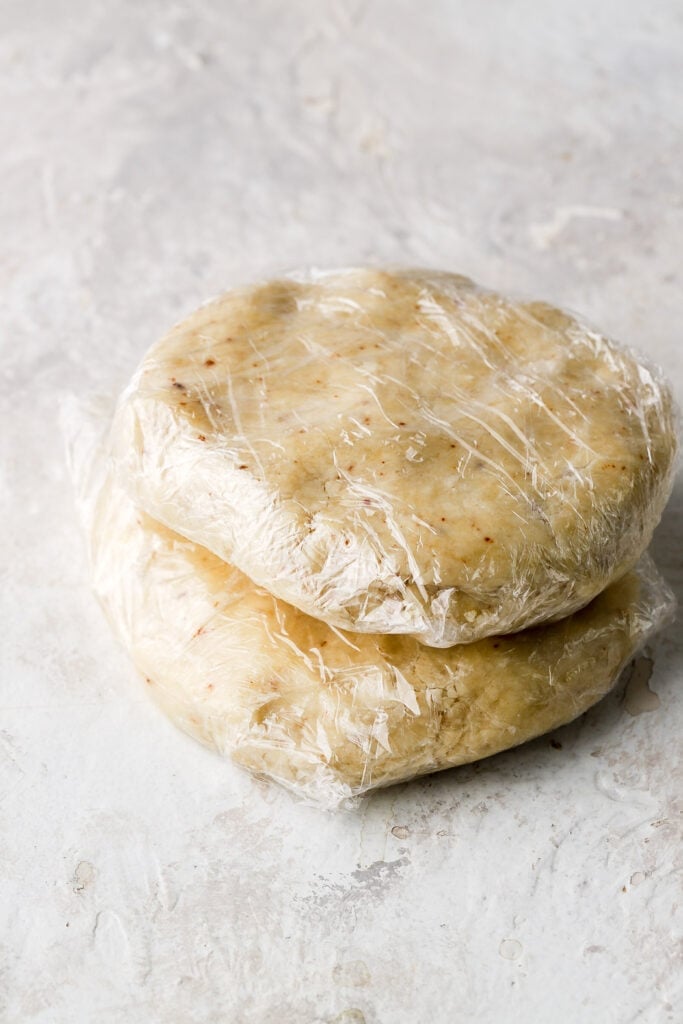
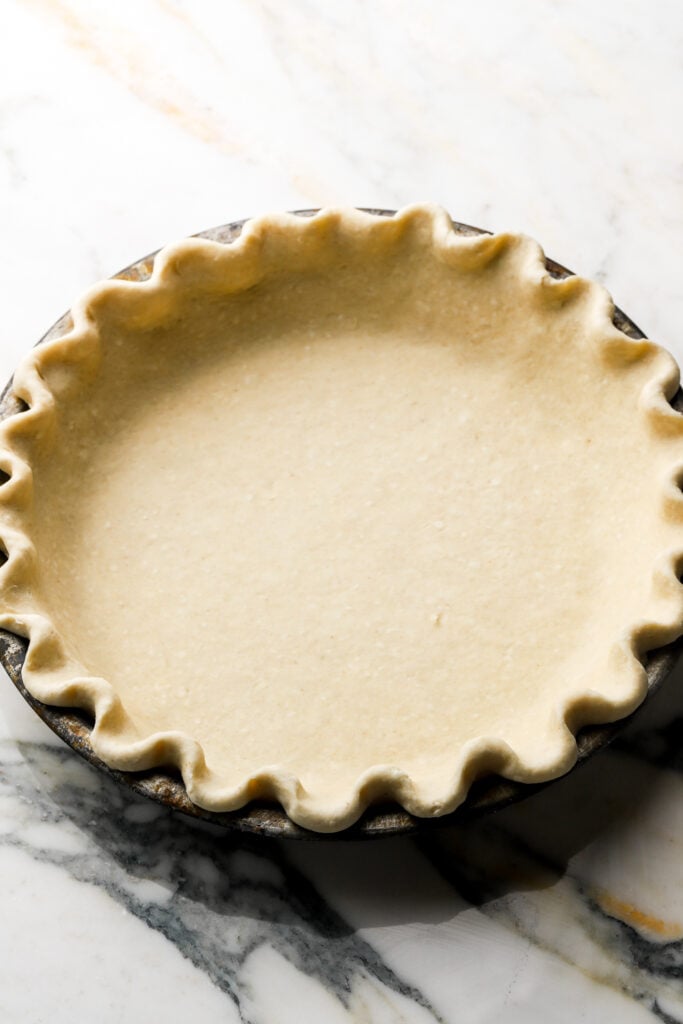
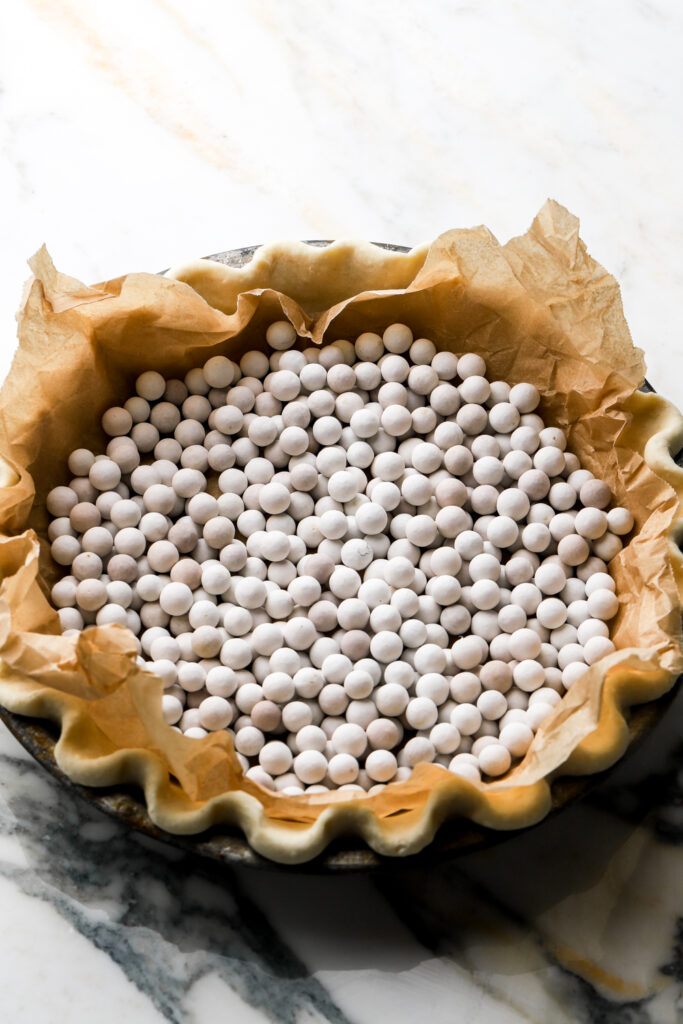
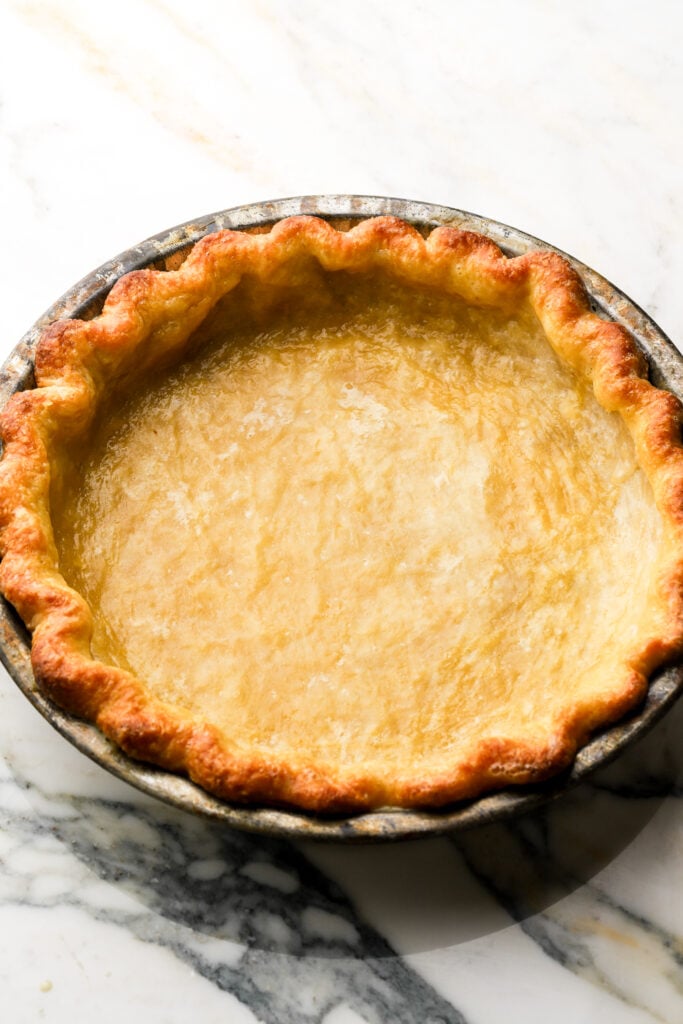
Brownie Filling
Step 1: Beat the egg in a small bowl and use a pastry brush to brush onto the cooled pie crust.
Step 2: Brown the butter: Place butter into a medium-size saucepan and heat it over medium-low heat. Stir occasionally.
- If the butter is cold, cut it into cubes first
Step 3: As the butter begins to bubble and foam, stir continuously. You’ll need to scrape the solids off the bottom of the pan. The milk solids will start to settle and darken.
Step 4: Remove it from the heat and continue stirring for about another minute until the butter darkens into an amber color.
Step 5: Pour over chocolate (in a separate bowl) and stir together until the chocolate is completely melted and the mixture is smooth.
Step 6: In a separate large bowl, add granulated sugar, brown sugar, cocoa powder, vanilla, and eggs. Whisk aggressively for 2-3 minutes.
Step 7: Add in the melted chocolate and butter mixture. Whisk until fully combined.
Step 8: Add in the flour and salt. Whisk the mixture just until the flour is incorporated and there are no visible streaks left.
Step 9: Pour the filling over the cooled par-baked crust and bake for about 40-45 minutes until the edges of the filling are puffed and set and the center still has a slight jiggle but is no longer wet.
- When the pie gets baked, keep an eye on the color of the edge of the crust. If it begins to brown before the filling looks set, remove it from the oven, cover the edge of the pie with foil and then continue baking.
Step 10: Remove from the oven, sprinkle sea salt flakes, and allow to cool to room temperature before refrigerating.
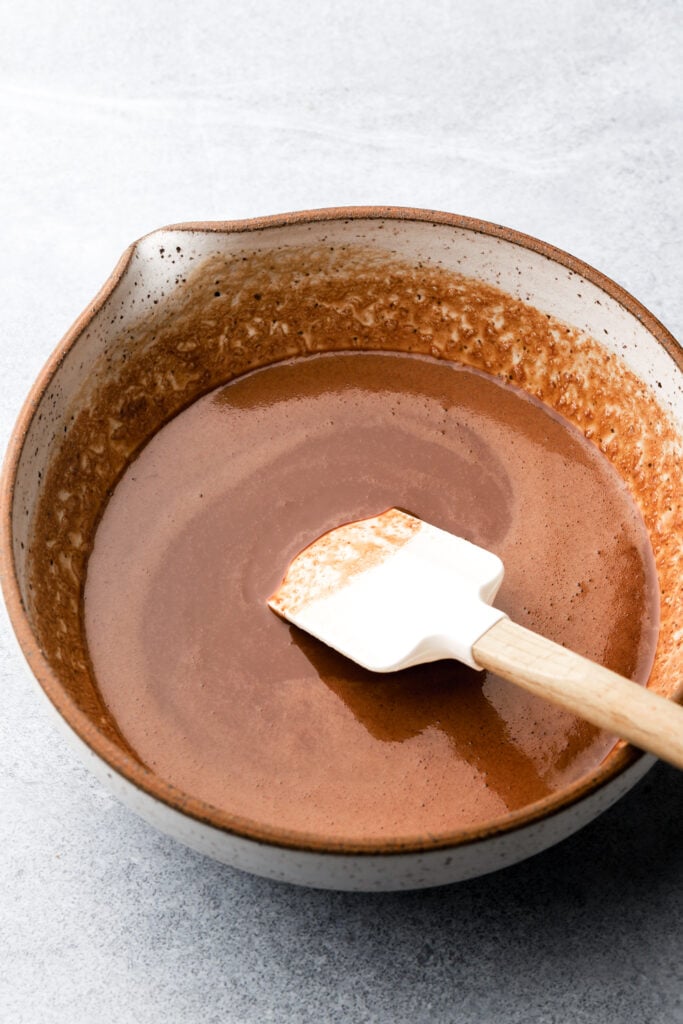
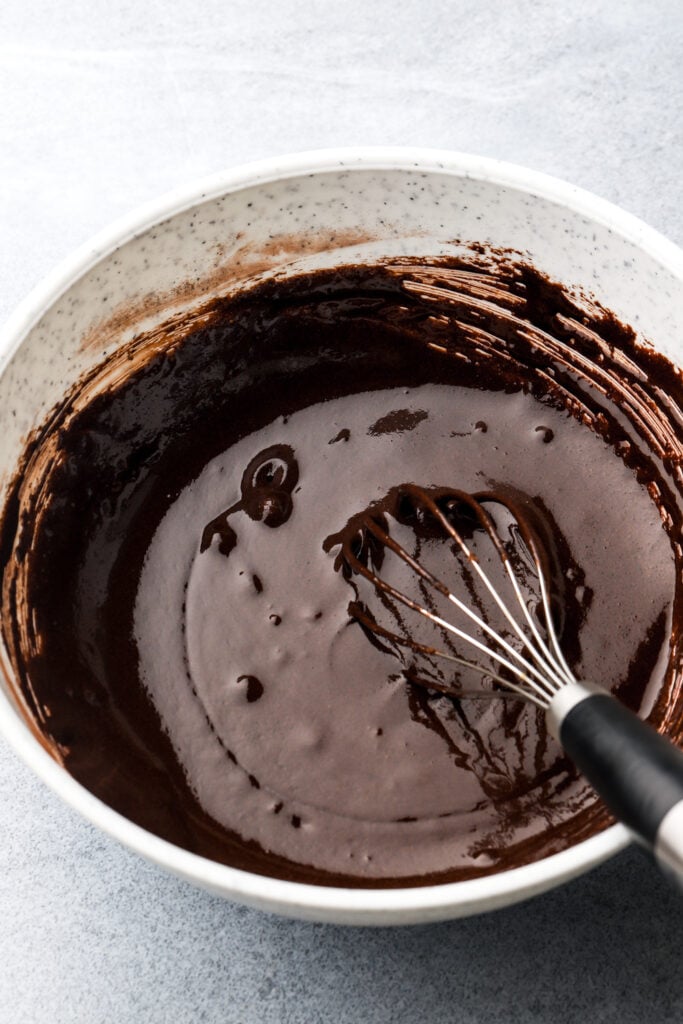
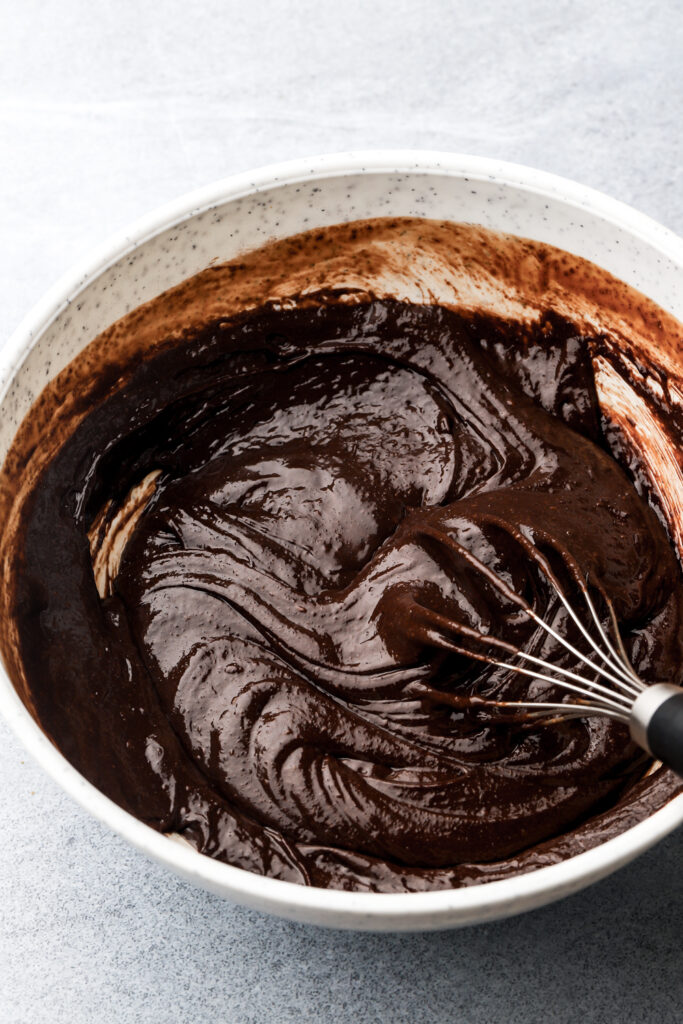
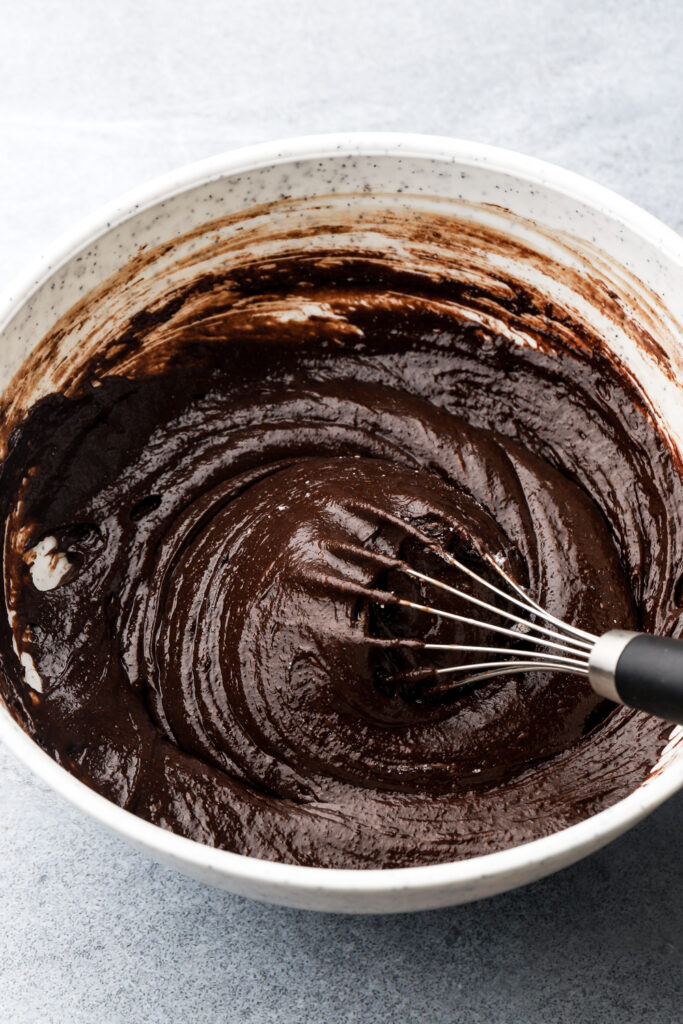
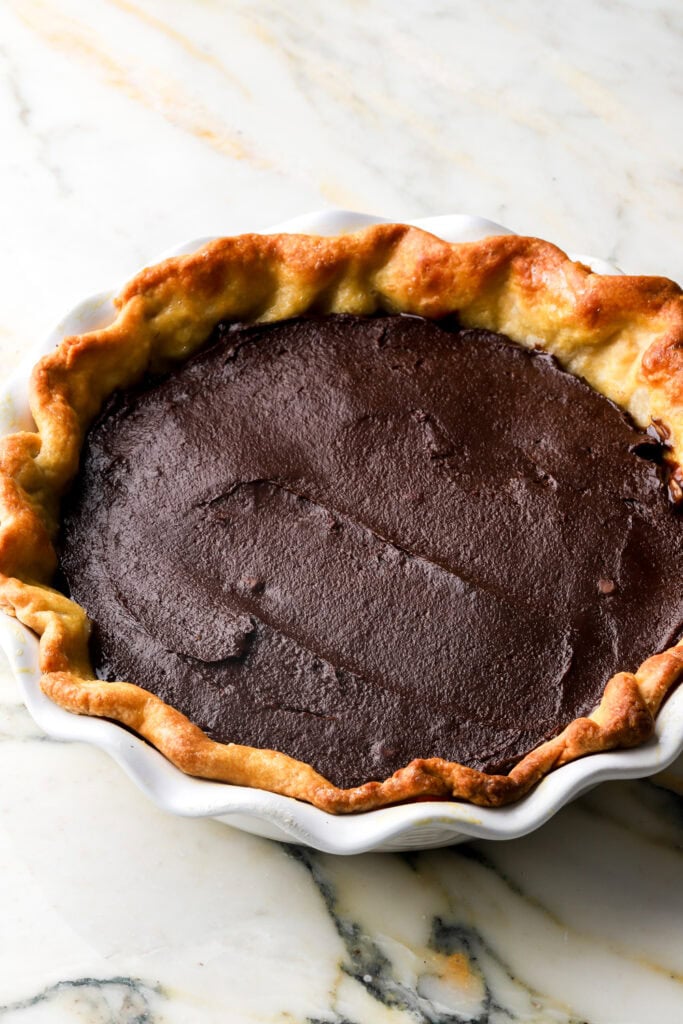
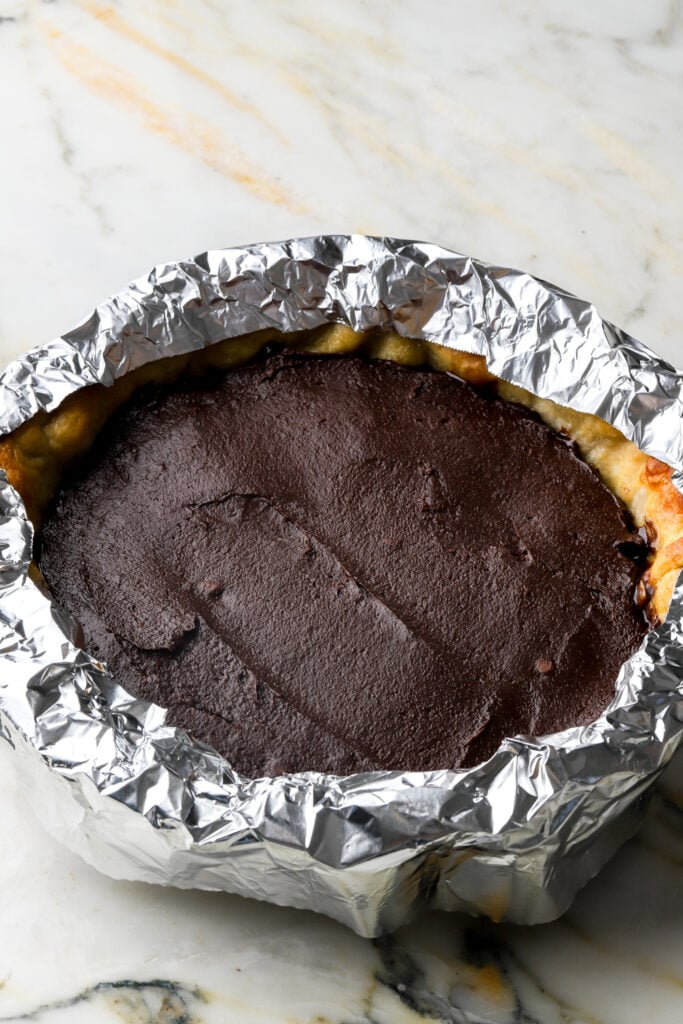
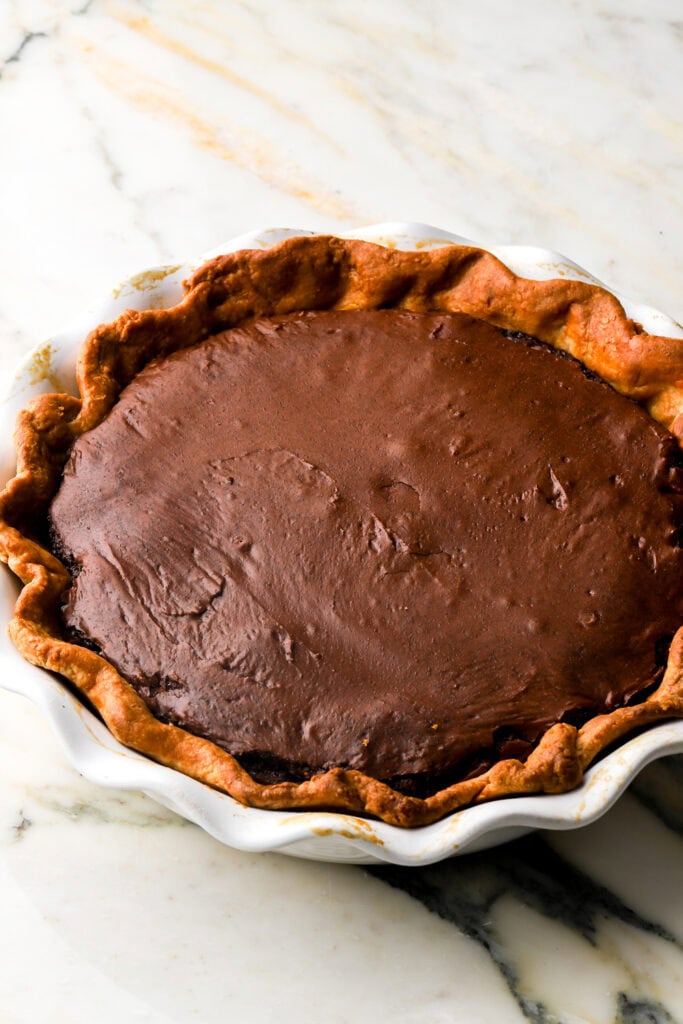
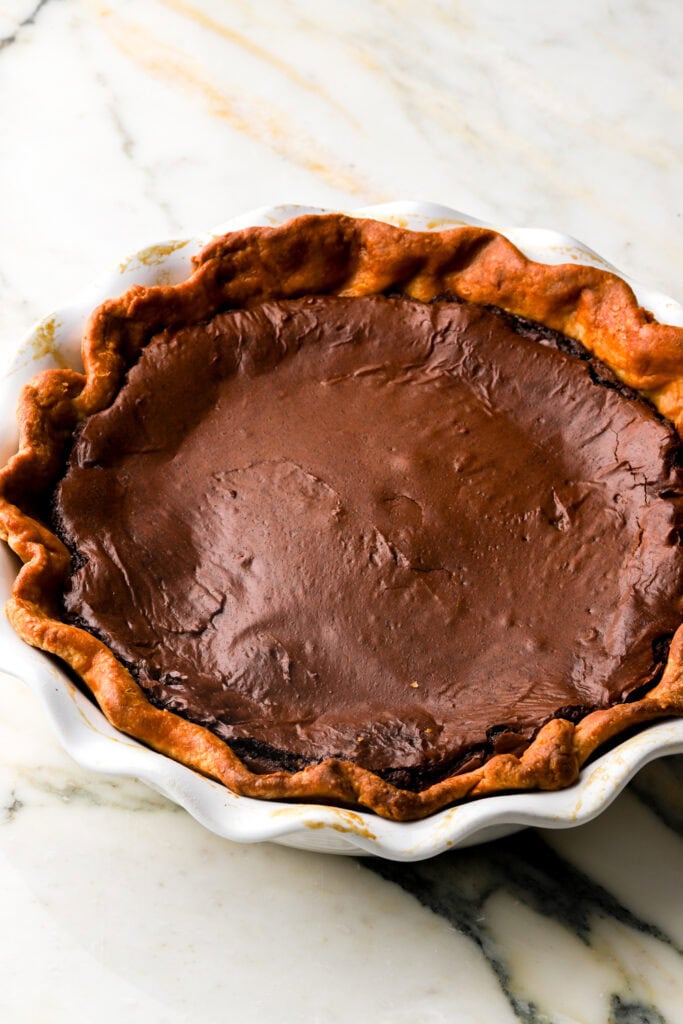
Tips For Getting The Pie Crust Just Right
- Temperature matters: to create a flaky crust, you want the butter to be cold so it doesn’t melt into the dough. To keep the butter as cold as possible I like to put my flour and sugar in the food processor bowl and then freeze the whole bowl while I cube my butter.
- Add the butter to the bowl and freeze for 5-10 more minutes.
- For ice water, I just put 1-2 ice cubes in the cup and then measure the water or measure the water and freeze it for a few minutes, as well.
- Temperature matters again: Refrigerate the pie dough for 1-2 hours after you’ve made it. This will allow the gluten to relax a little and keep the butter cold. Once it feels a little more firm, about an hour or so, you can roll it out. I roll out half at a time (so the bottom crust first and then the top crust) so the other half doesn’ t get too warm.
- If you’re making designs with the top crust and it starts to feel sticky/soft, just refrigerate it again for a few minutes.
- Temperature matters one more time: You want the pie crust to hold its shape while it’s baking. If you bake room temperature pie dough, the butter will melt right out and the crust will shrivel up.
- What you want to do is, once the pie is all done, pop it in the fridge or the freezer for about half an hour before baking. You want the crust to be firm and cold before baking so that it holds its shape.
- Temperature matters one last time: Depending on what you’re filling your pie with, the temperature of the oven matters. You always want to bake your pie crust at 350F (177C) or higher, if the oven is not hot enough, the butter will just leak out and the crust will shrivel up.
- I blind bake/par-bake my crust at 400F-425F (204-218C) and it sets beautifully without any major shriveling.
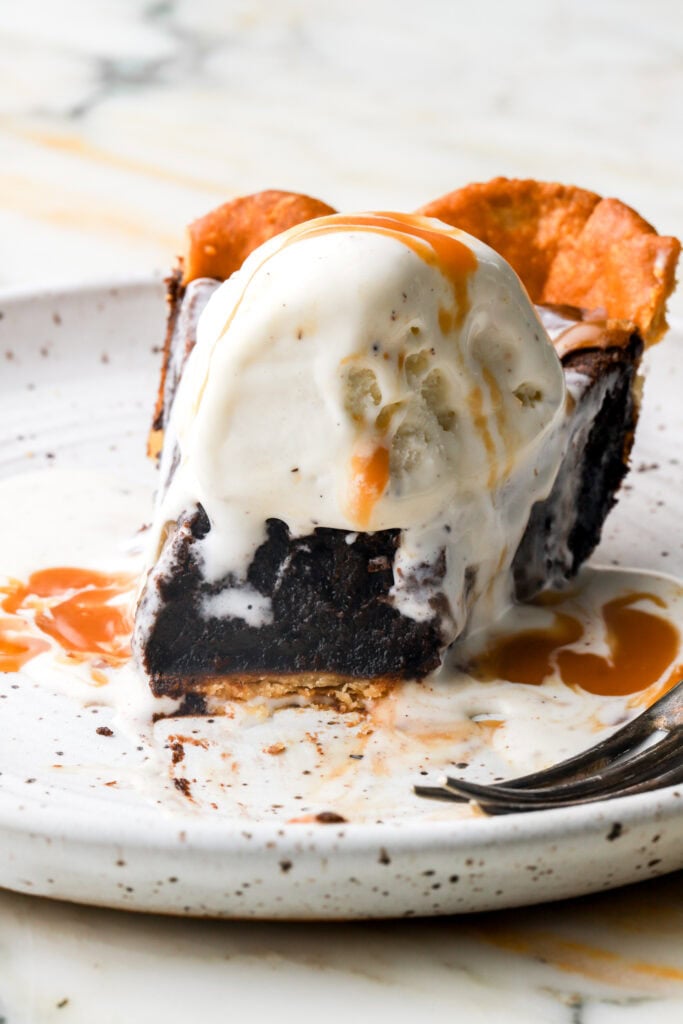
How To Roll Out Pie Dough
When I refrigerate my pie dough for 1-2 hours, it is firm but it’s still malleable and able to be rolled out. If your pie dough feels rock solid, let it rest on the counter for a few minutes until it’s able to be rolled out without cracking.
The dough should not be super sticky so just lightly flour the countertop and the top of the dough. Place the rolling pin in the center of the pie disc and roll out almost to the edge of the pie but don’t go past the edge. Then turn the dough 90 degrees and repeat until it’s about ⅛ inch thick and large enough to fully cover your pie dish.
You can either roll the dough around the rolling pin and unroll it over the pie dish or I like to gently fold the dough in half and then fold it in half again and then unfold it over the pie dish.
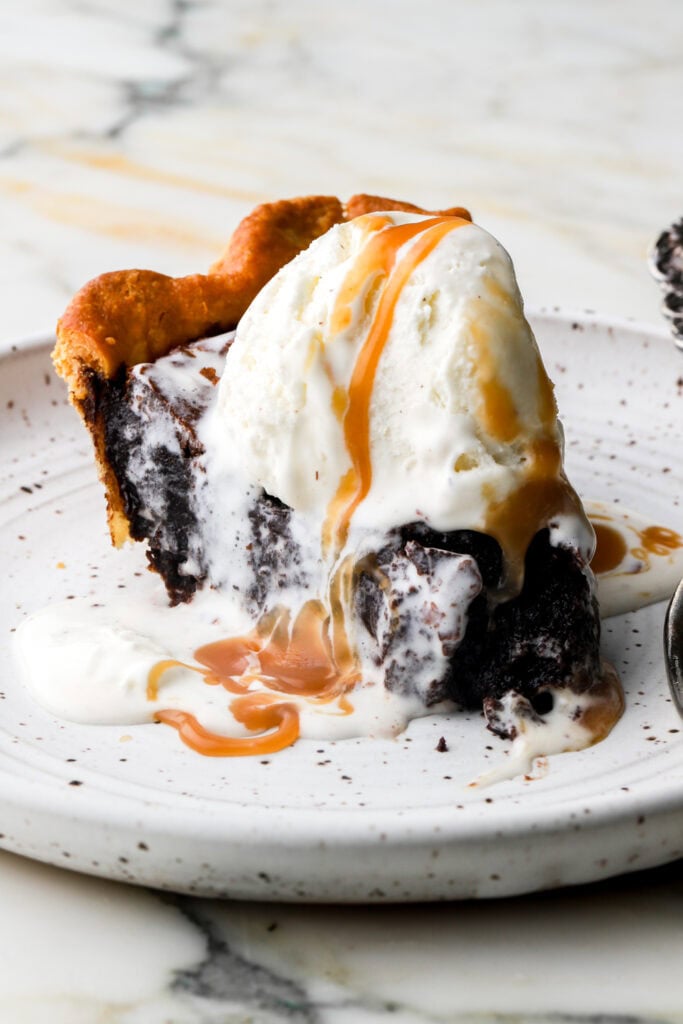
How To Par-Bake Pie Crust
Blind baking means to completely bake the crust before adding a filling and it doesn’t get baked anymore after the filling is added. This method of baking pie crust is good for precooked fillings or no-bake fillings such as custards made on the stove top, no-bake cheesecakes, lemon meringue pie, key lime pie, etc.
To blind bake the crust:
- Roll out your dough onto a well floured surface. Fold or roll the dough up and place it over the pie dish. Press it down on the bottom and adjust the sides as needed. Do whatever design you desire along the edge of the crust and then refrigerate or freeze for at least 30 minutes, until the pie feels firm.
- During this time preheat the oven 425F (212C) – can do less too if desired but don’t go below 350 (177C). Once the dough is firm, place a sheet of parchment paper (I like to crumple mine so that it fits more accurately) on top of the dough and fill it with pie weights. If you don’t have pie weights, use uncooked rice, dried beans or even flour. Place the pie dish on top of a cookie sheet (just in case there’s any butter spillage – I use a metal pan) and bake for 20 minutes (a little longer if oven temp is reduced a little), until it starts to get some color.
- Remove the pie crust from the oven and carefully remove the parchment paper with the weights from the pie crust. Allow the crust to cool completely (or at least most of the way) before proceeding with the recipe.
NOTE: I don’t ever use convection for baking pies because the last thing to finish baking is the bottom so you definitely want the heat coming straight from the bottom of the oven and not circulating to the top.
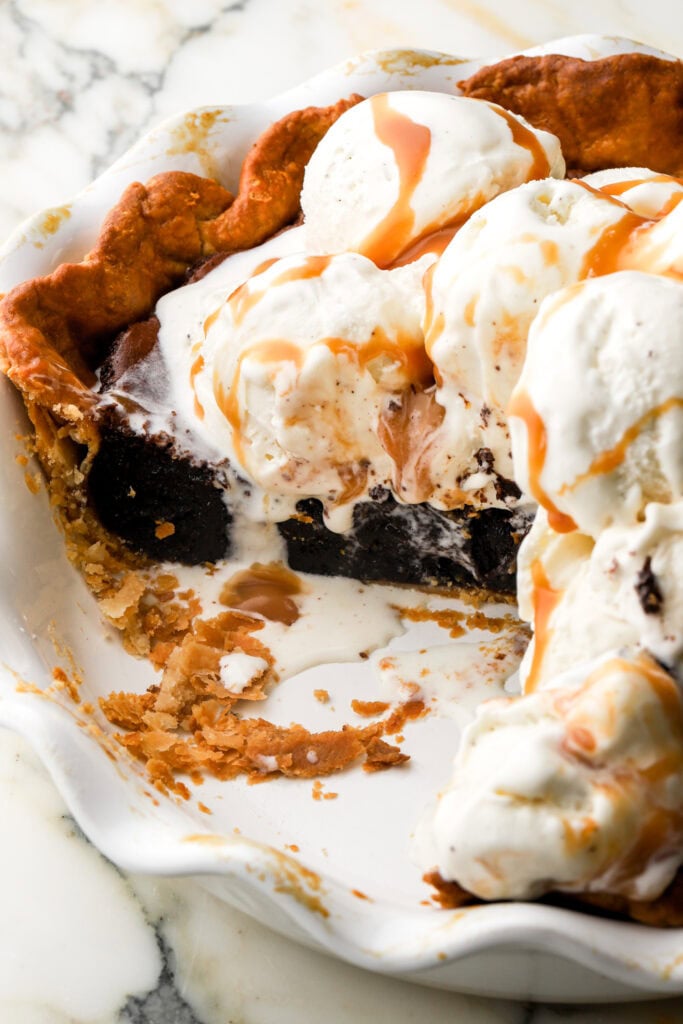
What Type Of Pan Is Best For Pies
I prefer to bake pies made with pastry in a metal pan. Metal pans conduct heat the quickest and most efficiently. Your crust will most likely have the best bake using a metal pan.
That said, I don’t always bake my pies in metal pans because my metal pan is quite shallow and I don’t have a deep dish metal pan so I use my ceramic ones for things like apple pie and it works fine with a few insurances.
I always make sure to bake on conventional (no fan) and not convection and I like to place it on the bottom rack so that the bottom pie crust gets direct heat. I also always place my pie dish on a metal baking sheet to catch any drippings.
I haven’t tried it but some people recommend using a baking stone underneath the pie dish to bring more heat to the bottom of the pie.
And if I’m baking a more hefty, wet pie like traditional apple pie, I usually sprinkle some sort of starch, like flour or cornstarch on top of the bottom pie crust to help absorb more of the filling juices.
For this brownie pie, I used my deeper pie dish. Any traditional pie dish should work fine besides those really shallow ones. The crust shouldn’t be soggy since it’s par-baked anyway but of course, if you have a metal pan that’s not super shallow/petite, that would always be best.
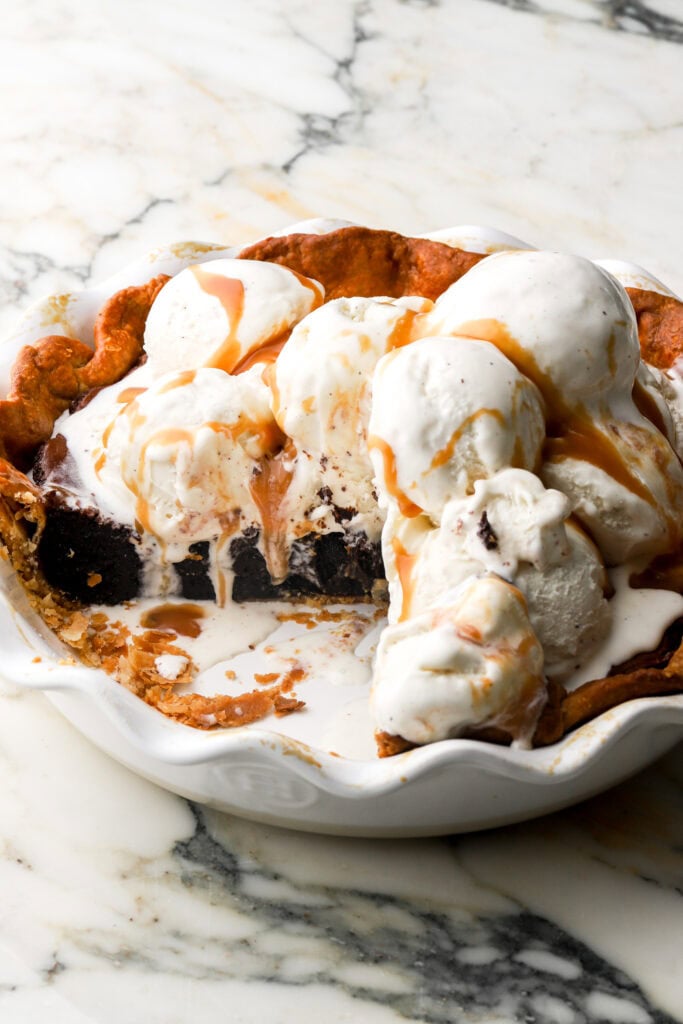
Frequently Asked Questions
It just needs a little more hydration, add another 1-2 Tbsp of water at a time until it forms a dough.
Your pie crust can crack when you go to roll it out if it’s not fully hydrated (see above) or if it’s too cold when you’re rolling it out. Just leave it out at room temperature for a few minutes before rolling.
The pie dough can leak butter if it wasn’t fully chilled or if the chunks of butter are too large in the crust. When you blend the flour with the butter, you want pea size chunks or smaller.
The pie will shrivel up and shrink when it’s baking if it wasn’t fully chilled before baking. You want the pie crust to be cold so the butter is firm when it goes into the oven.
The dough was overworked. You want to handle it as minimally as possible, once it comes together, let it be, refrigerate it and when you roll it out, use it. Don’t re-roll it out.
If the filling doesn’t set up properly it can be because it didn’t bake long enough or it didn’t cool long enough.
When it’s done baking, I like to press on the top of the brownies and it should be soft but with some resistance/structure – not runny.
You’ll also need to let the pie cool completely in order for the filling to set. I like to make my pie ahead of time and let it chill in the fridge overnight.
Then if you want to serve it warm just microwave individual slices.
I topped mine with a whole tub of vanilla ice cream and homemade salted caramel sauce. Of course I did that for photos, then I scooped it all back into the tub and served each individual slice with a scoop of ice cream.
You can also top it with whipped cream or just a drizzle of the caramel .
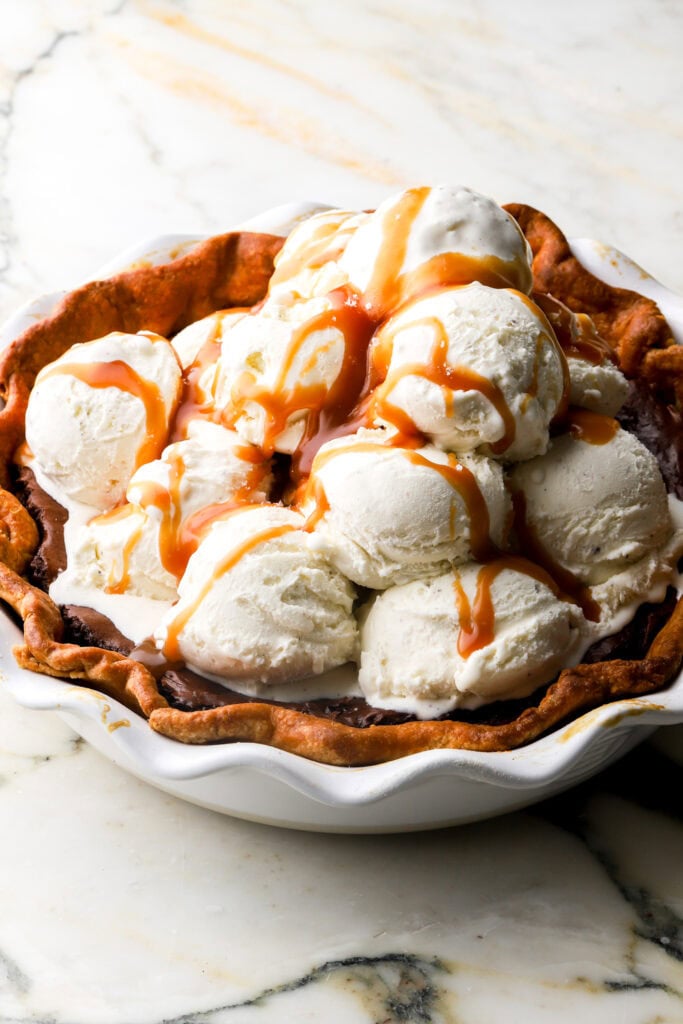
How to Store a Brownie Pie and Make Ahead Of Time
There’s a few ways to make your pie ahead of time
- Prep your pie dough ahead of time. You can refrigerate or freeze the dough before baking or even after par-baking.
- You can par-bake the crust a day in advance and just leave it at room temperature.
- You can bake the whole pie, let it cool to room temperature and then wrap the whole pie up tightly and refrigerate for a few days or freeze it for a few weeks/months.
- Slice the cooled pie and wrap each individual piece in plastic wrap and then foil, freeze for a few weeks/months.
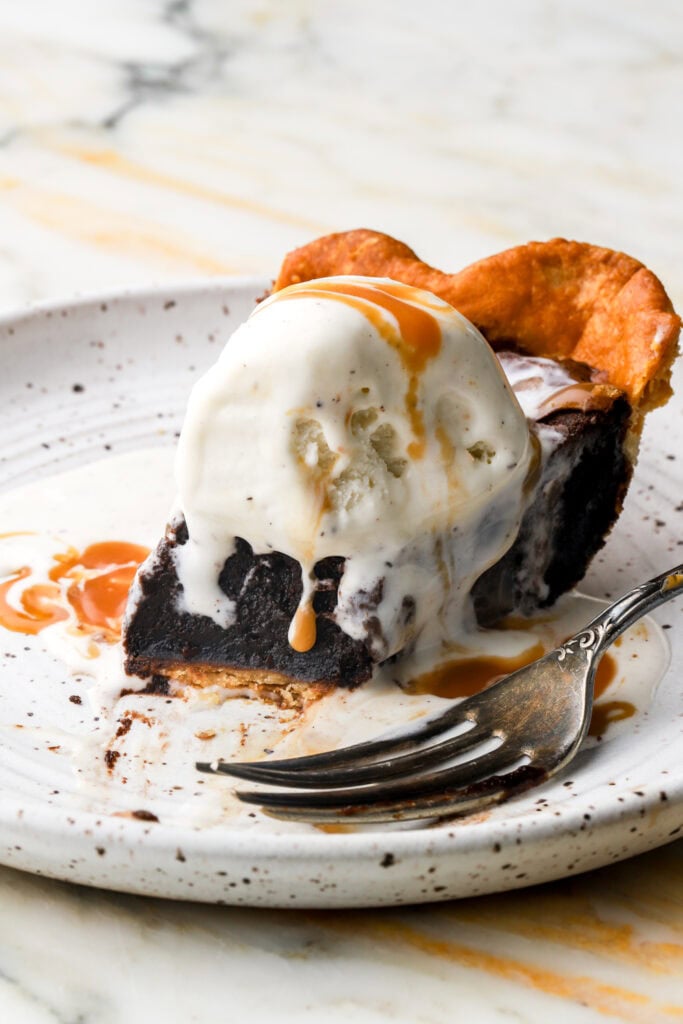
Thanks so much for reading today’s post, if you have any questions just comment down below.
If you make this Brownie Pie, I would love it if you left a review or a star rating for it in the recipe card.
As always, have a blessed day and happy baking!
Love, B

